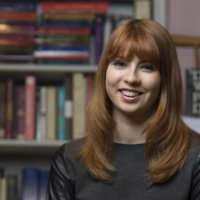An episode of the Spaces of Solitude podcast, presented by Dr Hetta Howes, has been recognised with a silver Lovie Award for ‘Best Individual Episode’ of a podcast
By Chris Lines (Senior Communications Officer), Published
A podcast presented by a City, University of London academic has today won Silver at The Lovie Awards in the podcast category of 'Best Individual Episode'.
Dr Hetta Howes, a Lecturer in Medieval and Early Modern Literature in City’s Department of English, won the award for ‘The Mind' – an episode of the Spaces of Solitude project.
The episode addressed questions including: What is the mind? Can we think of it as a 'space'? Where might we look for the mind and what might be going on inside it when we experience solitude?
Spaces of Solitude is a podcast series made as part of the Wellcome-funded Pathologies of Solitude project at Queen Mary University of London, curated by their research team and presented by Dr Howes.
The series looks at places and experiences of solitude and how these have changed over the centuries, from gardens, cities and sanctums, to potentially perilous places like prison cells and even the human mind.
Dr Howes said:
“I am absolutely delighted that this episode of Spaces of Solitude has come second in the category of 'best individual episode’ at the prestigious Lovie Awards.
“'The Mind' is a soundscape, a tapestry woven together from the voices of the episode curator, Akshi Singh, the poet and philosopher Denise Riley, the psychoanalyst Adam Philips and the neuroscientist Sarah Garfinkel.
“This was by far our most innovative episode, thanks to its brainchild, postdoctoral researcher Akshi Singh, and our wonderful producer, Natalie Steed, so it's fantastic to see it recognised.
Hopefully listeners will be persuaded to journey from the mind to the cell, the city to the garden or the sanctum – this series has something for every solitary wanderer.”
Listen to ‘The Mind’ episode of Spaces of Solitude
‘Reshape Possible’
The 11th Annual Lovie Awards this year have a theme of ‘Reshape Possible’ and are a celebratory showcase of this year’s best digital work from across Europe.
The 2021 winners have been announced on The Lovie Awards website, with a virtual ceremony to be held at 2pm today, hosted by comedian, writer and podcaster Deborah Frances-White, best known as ‘The Guilty Feminist’.
The mission of The Lovie Awards is to “recognise the unique and resonant nature of the European Internet community” – from Europe’s top web and creative networks and content publishers, to cultural and political organisations and individual creators, the Awards celebrate the most resonant and pertinent stories in Europe, both inside and outside of prevailing trends.
The Awards present Gold, Silver and Bronze winners as chosen by members of the International Academy of Digital Arts and Sciences (IADAS). In addition, the online public vote for their favourite Finalists to take home The People’s Lovie Award in each category.
Previous winners of Lovie Awards include Stephen Fry, Stormzy, and the European Space Agency. Pop band ABBA have also been recognised with a Lifetime Achievement award this year.
Pathologies of Solitude
Dr Howes [pictured] has been part of the Wellcome-funded 'Pathologies of Solitude' research network since its inception in 2017. The project, based at Queen Mary, University of London and directed by historian Professor Barbara Taylor, explores solitariness and its impact on health from 18th to 21st century.
Dr Howes’ own research, which focuses on voluntary solitude and its positive benefits in the devotional imagination, has found a welcome home in the project – she has presented at its colloquia and its seminar series, and contributed to its blog on the topic of social solitude among medieval anchoresses.
“However,” she said, “the most exciting role I have played in this project is as presenter of Spaces of Solitude”.
There are eight episodes of the series, each curated by one of the research team, which looks at places and experiences of solitude and how these have changed over the centuries, from gardens, cities and sanctums, to potentially perilous places like prison cells and even the human mind.
“We aimed to bring together a range of voices, from academics to artistic practitioners, to reflect on how certain spaces might be considered 'solitary' and how they manifest themselves in history, art, literature and culture," said Dr Howes.
“Highlights for me included a lengthy interview with the Archbishop of Canterbury on spiritual solitude, held in the hugely atmospheric crypt of Lambeth Palace, and a harrowing but surprisingly uplifting interview with academic and former political prisoner Shokoufeh Sakhi, who suffered solitary confinement in an Iranian prison.
“We recorded much of the series during last year's lockdowns, from makeshift studios in studies and bedrooms, cobbled together with pillows and sheets."
“Both myself, the podcast curators and contributors reflected on how the making of the series helped us to feel connected to the outside world.
“I felt particularly privileged to be involved in all of the episodes, to hop from space to space at will, while my own movements were restricted by the pandemic.”
